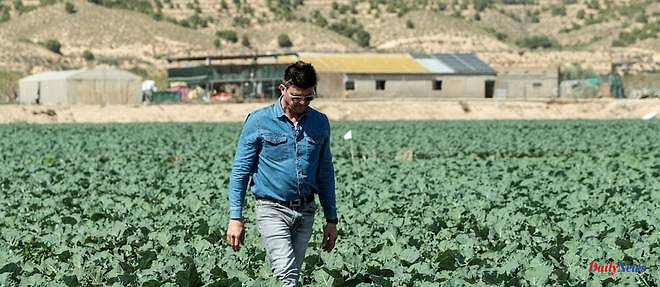Its cabbages, salads and watermelons flood European supermarkets in winter and summer alike. But for Juan Francisco Abellaneda, a farmer in the arid south-east of Spain, irrigated for years thanks to the diverted waters of the Tagus, everything is in danger of tipping over.
With repeated droughts and the enormous needs of intensive crops, the situation is about to change in this quasi-desert region where nearly half of the fruit and vegetables exported by Spain, the first horticultural power of the country, are produced. European Union.
To fight against the effects of global warming and the desertification which threatens 75% of the country, the government of Pedro Sanchez decided in February to limit the massive transfers of water carried out from the Tagus to the agricultural lands of the Spanish Levant.
Because at the same time, in the center of the country, the longest river in the Iberian Peninsula has seen its flow drop dangerously - to the point that in places, in summer, it is possible to cross on foot its bed transformed into a band of cracked earth.
As with the Nile in Egypt or the Tigris in Iraq, the water of the Tagus, which flows over a thousand kilometers in central Spain to empty into the Atlantic Ocean in Portugal, has become a source of tensions.
A conflict exacerbated with the approach of regional and legislative elections, while Spanish intensive agriculture, the economic pillar of the country, sees its model called into question.
"If we are taken away (the water from the Tagus), there will only be desert here," sighs Juan Francisco Abellaneda, owner of a 300-hectare farm near Murcia.
In this abnormally dry start to spring, the 47-year-old market gardener, tanned and gravelly-voiced, anxiously inspects his rows of broccoli, planted in dusty furrows.
With his brothers, he exports 3,000 tons of fruit and vegetables each year. The activity is flourishing, as for many farmers in the region where there are huge greenhouses, brand new sheds and orchards as far as the eye can see.
But "if we don't get water, what are we going to live on?", is alarmed by this founding member of an agricultural cooperative with 700 employees (Deilor), who fears that his production will drop during the coming months with job losses as a result.
At the time of his father and his grandfather, farmers before him, the region of Murcia was one of the poorest in Spain and its agriculture mainly subsistence.
"The region is one of the driest" in the country, recalls Domingo Baeza, professor of river ecology at the Autonomous University of Madrid. "Water resources" are structurally "insufficient" for intensive agriculture.
To circumvent this handicap, Spain has bet on a gigantic infrastructure: the "Trasvase Tajo-Segura". A 300 kilometer structure combining canals, tunnels, aqueducts and reservoirs, intended to divert part of the waters of the Tagus towards the Segura basin, straddling Andalusia and Murcia.
Launched under Franco's dictatorship in the 1960s and commissioned in 1979 as part of major works to develop agriculture, this work - capable of transporting billions of liters of water per year - has long been seen as a model of adaptation to the lack of rain.
The Spanish Levant, which includes the provinces of Murcia, Alicante and Almeria, has thus taken off, with an annual turnover of three billion euros and more than 100,000 direct and indirect jobs.
But today, "the Tagus is suffering", continues Domingo Baeza. "It is very degraded in many places" because "we have far exceeded the capacities" of the river by "uncontrollably developing irrigated areas."
Since the installation of the Trasvase, the average temperature in Spain has increased by 1.3°C, according to the meteorological agency Aemet. The flow of the river has dropped by 12% and could drop by 14% to 40% by 2050, according to the government.
The extreme heat waves of recent years - sometimes exceptionally early, like the one that has hit the peninsula in recent days - have dried up rivers and reservoirs, leading to water cuts.
With "global warming, the situation has changed", says Julio Barea of Greenpeace Spain. The Trasvase "is no longer adapted" to the needs of the country: "the Tagus needs the water" withdrawn for the crops of the southeast "to survive", he says.
In Castile-La Mancha, a region in central Spain where the deviations begin, the cumulative effects of water punctures and lack of rain have been visible for a long time.
"Our territory has been sacrificed" for the benefit of farmers in the Levant, denounces Borja Castro, socialist mayor of Alcocer, a village of 300 souls located near the Entrepeñas and Buendía reservoirs, where the water sent to the south is pumped. East.
Called the "Sea of Castile" because of its huge artificial lakes, born with the construction of dams on the Tagus in the 1950s, this region once attracted many visitors.
People came here from the city on weekends to sunbathe, go boating, try its restaurants or admire its turquoise waters wedged between hills covered with pines and holm oaks.
"It was the local pool...it was very lively," said Borja's father, Carlos Castro, 65, pointing to the ruins of a cafe near which he used to swim as a teenager. Now "it looks like a desert (...) it hurts my heart", sighs this former bank employee.
Around it, the beach has given way to an embankment of earth and rough grass, overhanging the waters of the lake below by several tens of meters.
"Everything stopped when we started to carry out these cursed transfers of water: the water left and with it the businesses, the employment and part of the inhabitants", continues the mayor of Alcocer, who claims the total cessation of water withdrawals in his region.
"We have converted the Levant into the vegetable garden of Europe, but with a resource that comes from elsewhere: it's irrational", annoys the dynamic 32-year-old councilor.
The government plan plans to reduce the ceiling for transfers via the Trasvase from 38 to 27 monthly cubic hectometres by 2027, except in the event of heavy rains.
This drop in withdrawals of almost 30% is supposed to raise the waters of the Tagus and protect its fauna, which is now threatened.
But without this water, in the south-east of the country, "we will not be able to maintain competitive and modern agriculture", at the risk of harming "food security" in Europe, warns Alfonso Gálvez, local leader of the union. agricultural Asaja.
According to the Central Union of Irrigators of the Tagus-Segura Aqueduct (Scrats), the reform could lead to the abandonment of 12,200 hectares of crops, an annual loss of earnings of 137 million euros, the loss of 15,000 jobs.
Media offensives, demonstrations, legal action... With the approach of the regional elections at the end of May, the debate took on the appearance of trench warfare, with the formation of sometimes unnatural alliances.
The socialist region of Valencia joined that of Murcia, led by the conservative People's Party (PP), to demand the abandonment of the decree. That of Castile-La Mancha, socialist, supported the executive of the left, with the punctual support of elected officials of the right.
The government says it is complying with Supreme Court rulings as well as EU environmental rules, which require watershed protection plans. And promises increased investment to develop alternative water sources.
The decree is based on "the best scientific knowledge" possible, assures the Minister of Ecological Transition, Teresa Ribera, who relies on the desalination of seawater - already used in small quantities - to compensate for the drop in water transfers .
The solution leaves farmers dubious. Desalinated water "lacks nutrients" and "has a significant environmental impact because it takes a lot of electricity to produce it" and this process creates "waste" that is harmful to the marine ecosystem, Alfonso Gálvez points out.
The president of the region of Murcia, Fernando López Miras, also underlines its cost, three to four times higher than water from the Tagus. "We're talking about 1.4 euros per litre. That's the price of a liter of petrol!"
Desalinated water can be "a complement, not an alternative", continues the conservative official, recalling that "Spain's water belongs to all Spaniards according to the Constitution".
For Spanish ecologists, it is actually a whole system that needs to be reviewed.
"In Spain, more than 80% of fresh water is used by agriculture (...) This situation is not tenable", judge Julio Barea.
To avoid a "hydrological shock", the head of Greenpeace calls for drastically reducing the areas dedicated to intensive agriculture: "Spain cannot be the vegetable garden of Europe, while the water there is increasingly rare."
02/05/2023 05:57:27 - Totana (Espagne) (AFP) - © 2023 AFP












